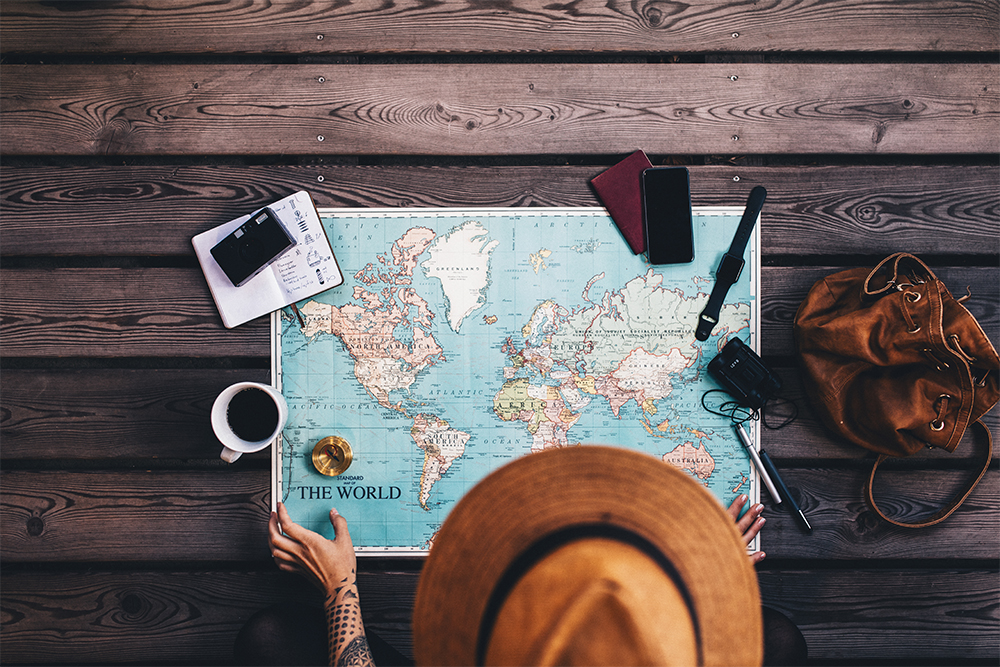Nearly half of Poles plan to go on vacation this year, and the vast majority will spend it in Poland. What are our attitudes toward travel after months of pandemic restrictions? Is the fear of infection or another wave of restrictions still present in our lives and translates into more modest plans, or is it exactly the opposite and we want to compensate for the long period of closure? We decided to answer these and many other questions about the attitudes of Poles by analyzing the next wave of the HX Study, prepared by the Starcom media agency and the Data Science department of Publicis Groupe.
Poland or going abroad
Vacations in Poland are traditionally the first choice of Poles, while trips abroad are planned by only ¼ of Poles. The proportions are not surprising – similar indications result from reports published in 2020. However, let’s take a look at this year’s motivations of Poles and see what factors influence the choice of a holiday destination.
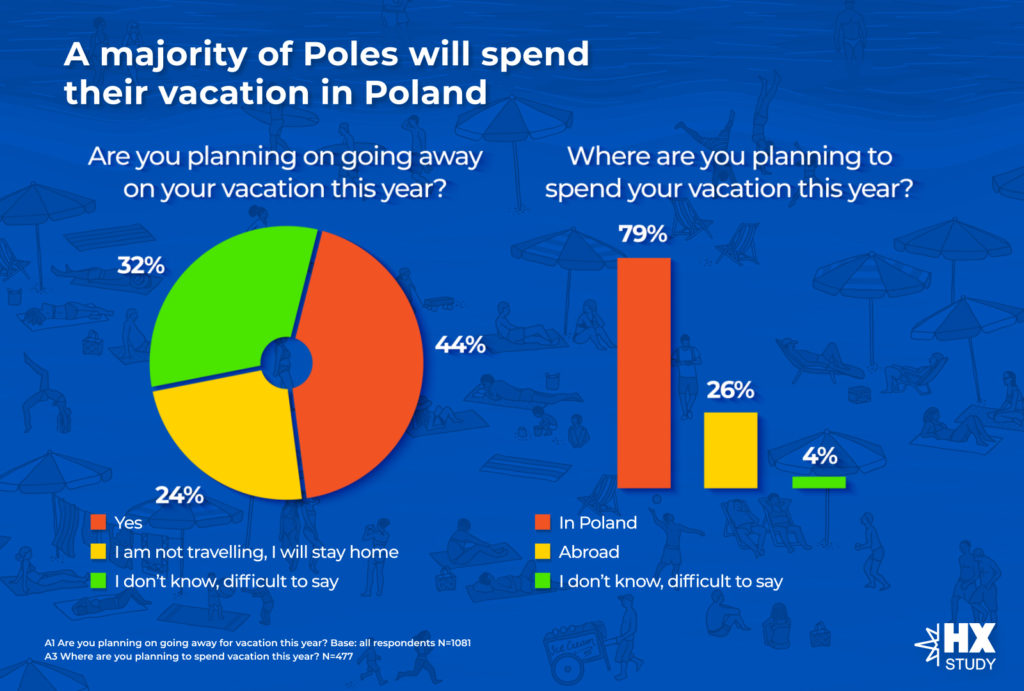
It turns out that the pandemic plays an important role in our holiday plans and scenarios. We minimize the risk of infection as well as avoid the inconvenience of traveling during the pandemic. The largest number of travelers, 79%, cited the ability to cancel as the most important factor in deciding where to go. And here you can see a gap in the system. Most of us will spend our vacations in Poland, which translates into a huge demand for accommodation, and finding free and good places in the summer season borders is next to impossible. On the other hand, we can see what a problem the rigidity of reservations is for vacationers. An ideal solution for all parties would be a platform integrating last-minute accommodation released at the last minute. Such solutions, although available, are still not very popular. Their development and promotion would have great potential.
Other criteria for choosing a place for relaxation, indicated by 2/3 of travelers are: ensuring safety on site (disinfection, restrictions on the number of guests, etc.) and proximity to the place of relaxation and place of residence, allowing for a quick return home if necessary. Two issues may be key here. Firstly, logistics and a much quicker return home if we stay in Poland. Another disadvantage is the ever-changing requirements for testing, vaccinations and quarantine. Staying in Poland we do not risk unplanned complications accompanying the border crossing. According to the survey, it is the necessity to take a Covid-19 test beforehand that can effectively discourage people from leaving. Places that do not impose such a condition will be chosen by as many as 60% of respondents.
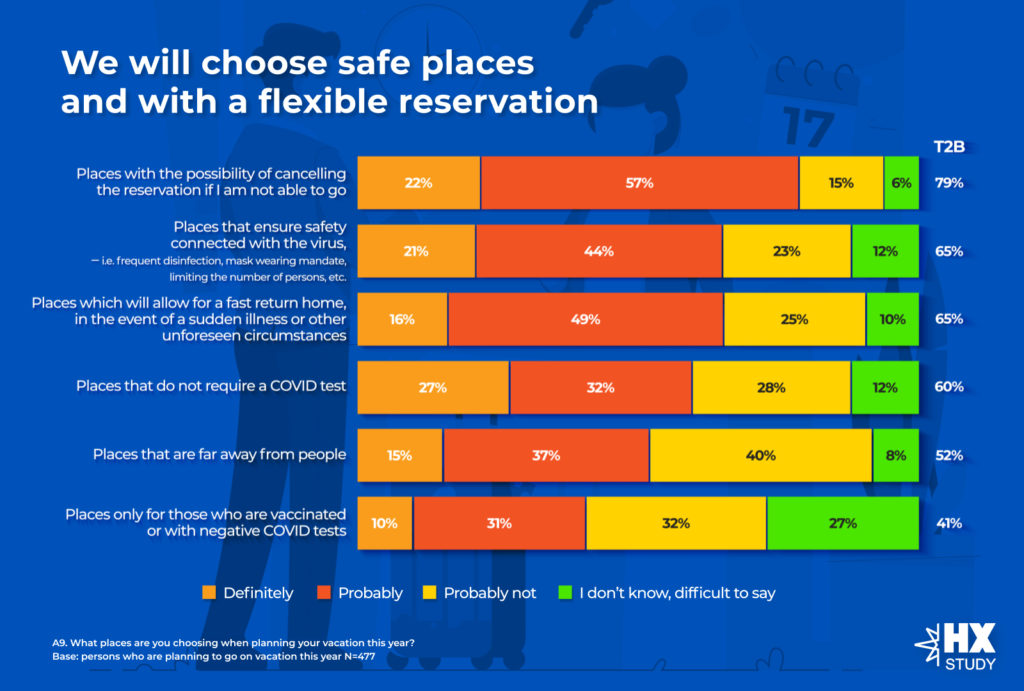
We still have a lot of fears and it seems that the coming vacations will not be like carefree madness. Many Poles declare that they will avoid crowded places. We also treat sports equipment or life jacket rentals with reserve. Of course, the level of these concerns is different among those who decide to leave and those who will stay at home this year, but even among those leaving, we see a decidedly cautious approach to leisure. Interestingly, among people planning vacations, as many as one third fear that the development of a pandemic could thwart their plans.
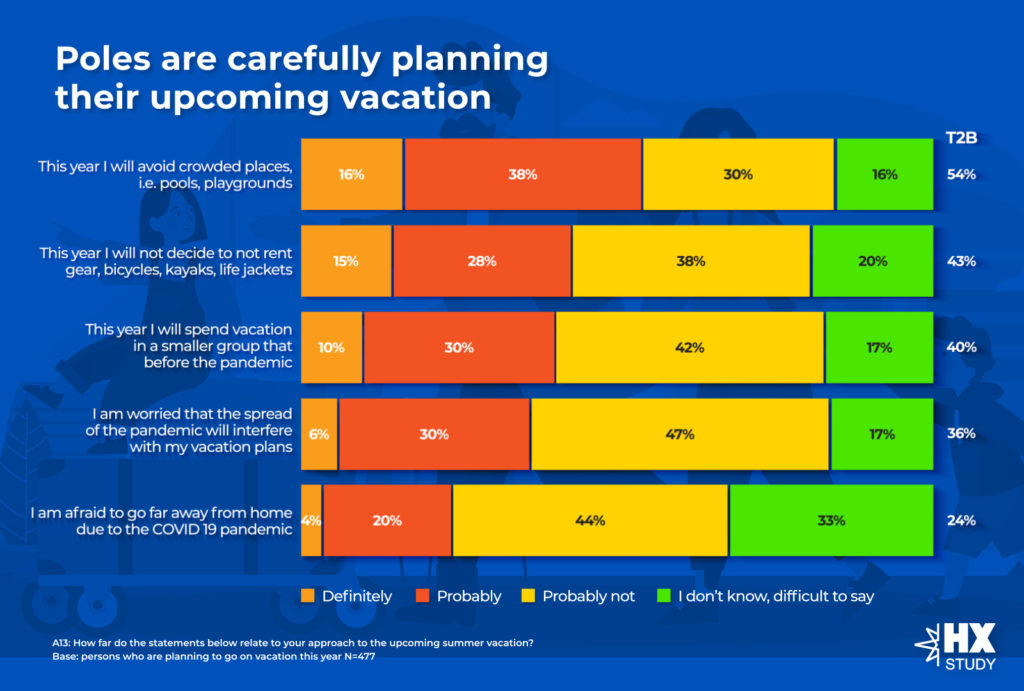
Safer with insurance
Since so many Poles take various developments during their vacations into account, how important is travel insurance for us? Slightly more than 1/4 of respondents going on vacation this year, will buy insurance. However, if you are planning a trip abroad, 61% of Poles will take out travel insurance, which is 3 times higher than those planning to spend their vacations in Poland. It is no surprise that we feel much more secure in our own country, but it does give information that travel insurance, which until now has been a nice, albeit niche product, is now becoming almost a matter of course.
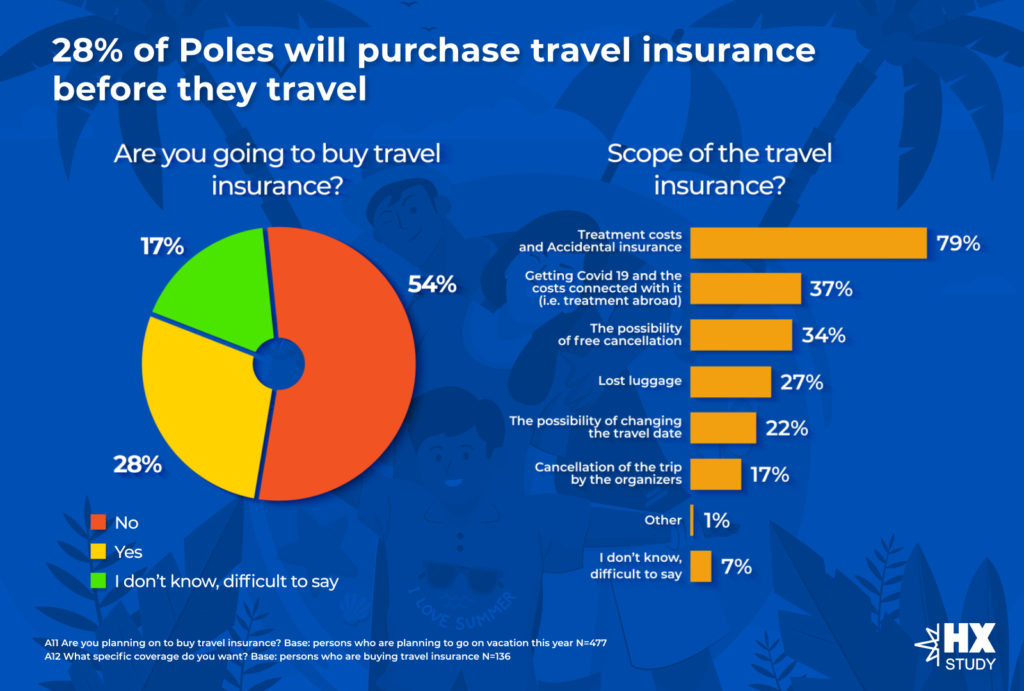
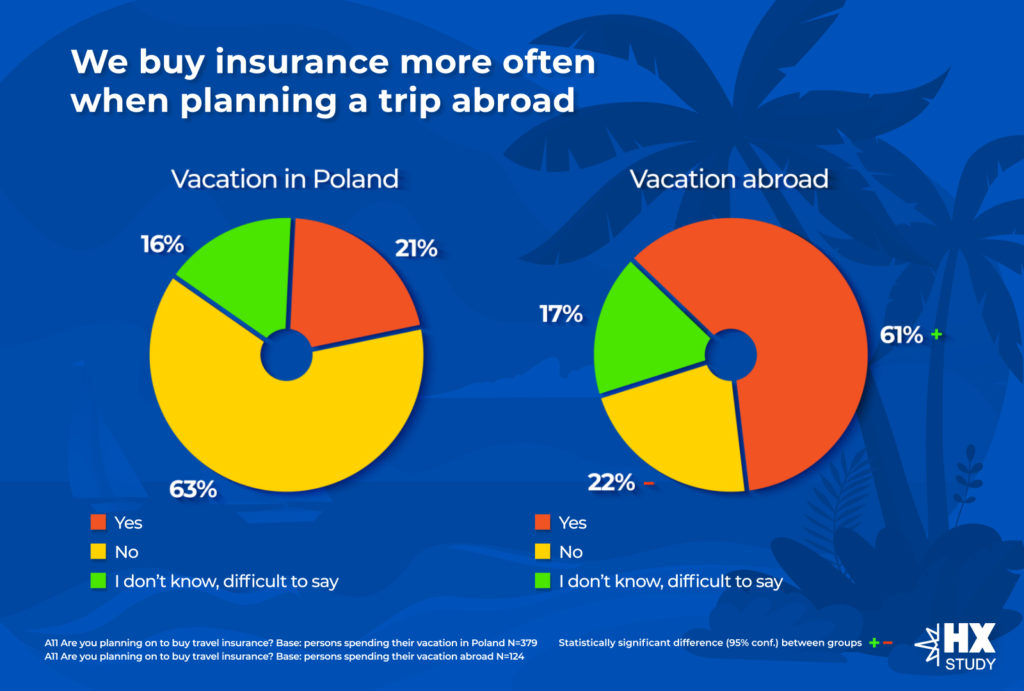
We plan alone, we go together
Regardless of our fears, we like to make our own decisions about our vacations. As many as 85% of Poles will plan their trip on their own, and only 10% will use a travel agent. We travel with our partners most often. When looking at the demographics of travelers in more detail, holiday travel is more popular among people in informal relationships. By contrast, it is more common for single, widowed, divorced and separated people to stay at home. It seems that we like to share holiday experiences with someone close, preferably in the early stages of a relationship, and only 7% of respondents plan to travel alone. This could also mean that the entire travel market is designed in such a way that going alone is completely unprofitable. This conclusion gives some clue that there is still a niche in the market regarding trips for singles who, under standard circumstances, do not find good and profitable deals for themselves, thus giving up on a vacation even though they still have the need for a vacation.
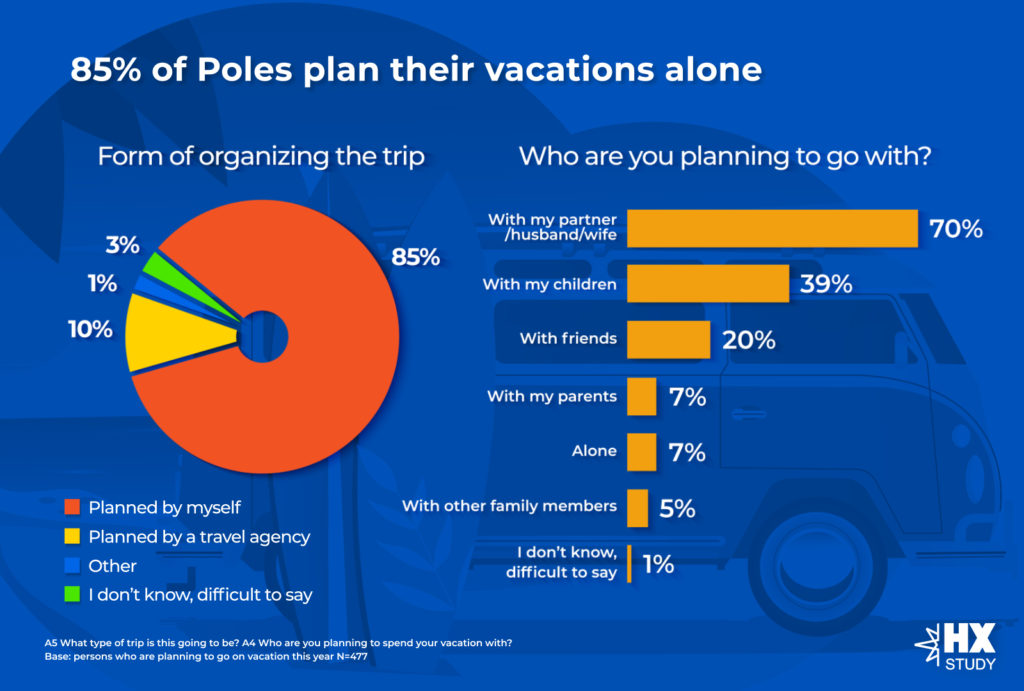
You want to have guests, take care of recommendations and referrals
What do we suggest when planning a trip? Certainly we compare different offers, using booking sites. We also like what we know, so many Poles will choose places where they have already been. And if we don’t know it personally, we are willing to take recommendations. We rely both on the recommendations of family and friends, as well as increasingly willing to use the opinions posted on the Internet. 21% of Poles suggest reviews appearing directly next to offers, and rely slightly less on the opinions that we can read on social networks. We can see a certain tendency here – we like to choose a trip on our own, but on the other hand we do not want to buy a pig in a poke. This shows the huge potential of recommendations and referrals in digital channels.
Social media plays an increasingly important role in the process of choosing accommodation for a trip. By visiting the Facebook fanpage of a hotel or guesthouse, we can see reviews and ratings given by guests and photos they have published. What’s more, we can see which of our friends have checked into this place and learn more in a private message. Undoubtedly, browsing reviews and content in social media is a part of customers’ decision-making process – says Barbara Drapała, Head of Social Media Performics.
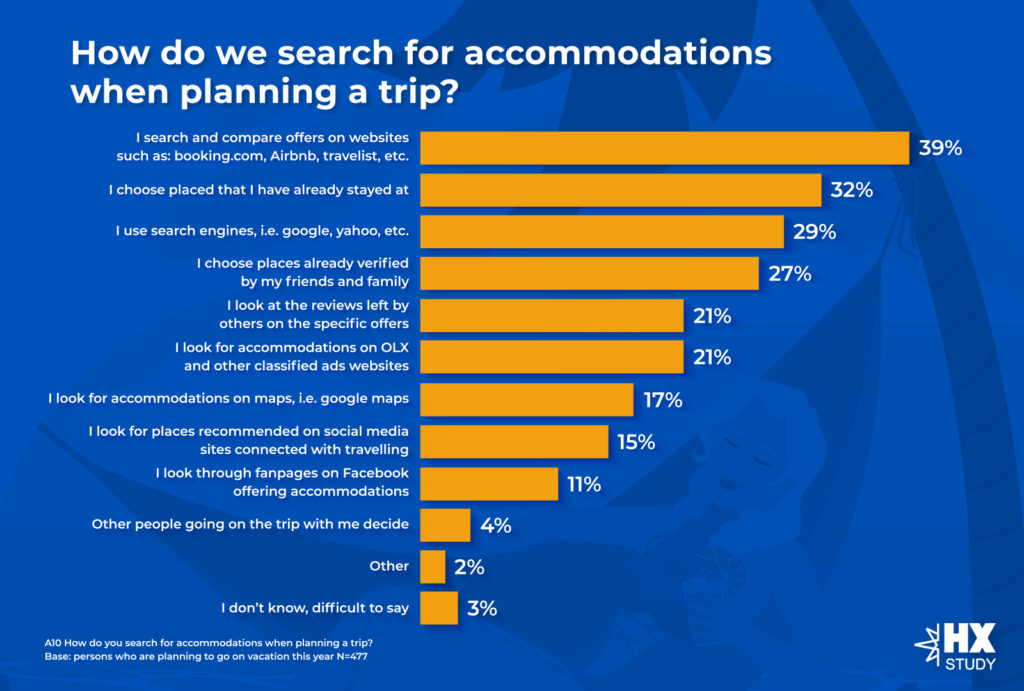
Card payments are becoming more and more popular
Another topic that seemed important to us was the attitude of Poles to cash and non-cash payments. We already know that insurance gives us a sense of security, especially when traveling abroad. But what about our wallets? Here we also zoomed in on trips abroad. What are the conclusions? Let’s start with the fact that cash is and has been the queen of payments.
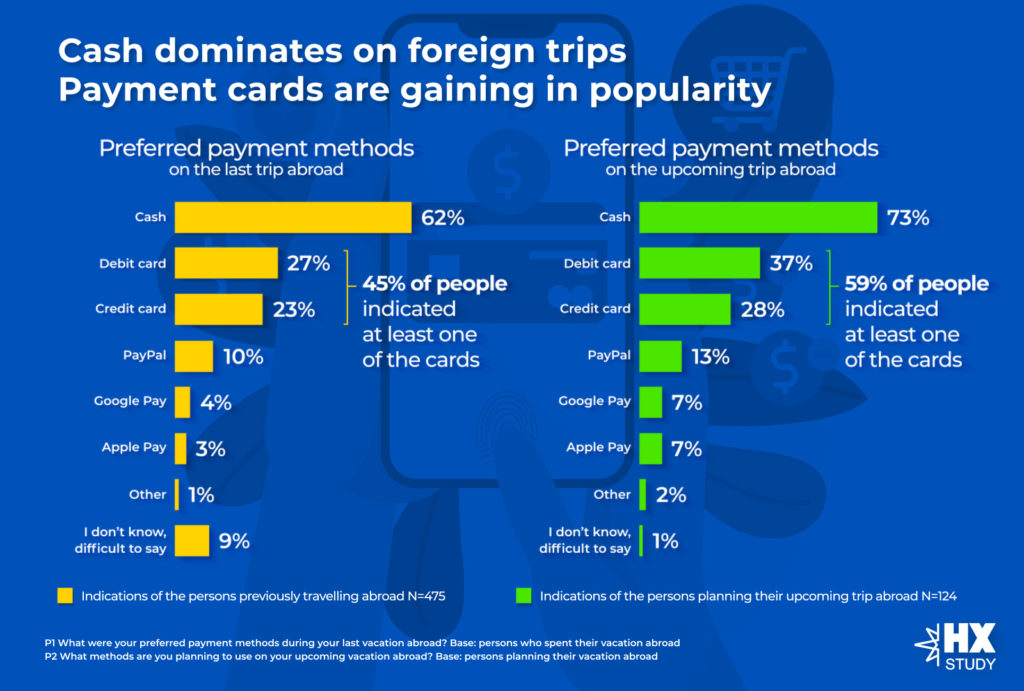
Using this form of payment abroad is indicated by most, because as many as 3/4 of Poles. The percentage of indications is even higher than for trips abroad before the pandemic. However, an even greater increase can be observed in the case of payment cards. Already 59% of Poles declare that they will use at least one of the cards, credit or debit.
Poles’ fear of electronic payments abroad is gradually fading. More and more often we appreciate the convenience of the card. During trips we do not have to look for an exchange office or ATM and nervously check our cash balance. For others, the biggest benefit may also be the temporary deferral of payments, which makes the overall holiday spending less painful. We make sure that the rules of using the cards are as clear as possible, and everyone can choose the variant most suitable for themselves. Many banks and fintechs offer Visa cards which allow for settling foreign currency transactions directly at the organization’s exchange rate – without an additional bank commission for currency conversion – says Katarzyna Jezierska, Head of Marketing CEE VISA.
In what other situations, apart from foreign trips, does the card become more popular? Card payments are one of the ways to protect children when they travel without their parents. First of all, there is no risk of losing cash or exposing children to theft. Secondly, parents can easily monitor their child’s finances and replenish their holiday account if necessary – adds Katarzyna Jezierska.
The HX Study shows that almost 40% of school-age children travelling this year will have their own card and 12% of parents will give them their card for the duration of the trip.
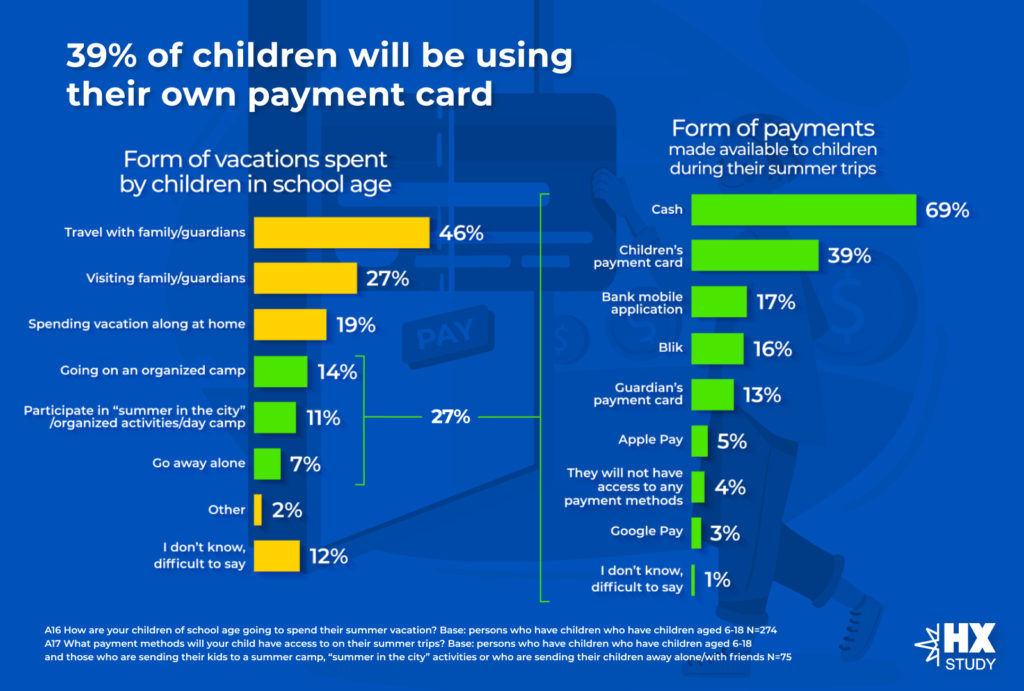
We expect more, we demand more
So how can we sum up this year’s vacations of the Poles? What emerges from the survey is a picture of well-considered and prudent travels. It’s likely that the prevailing uncertainty and restrictions on travel effectively discourage some Poles from travelling further, hence by far the largest number of Poles will stay in Poland. This summer’s edition of the HX Study once again shows that Poles like to decide for themselves. Most of us will organize vacations on our own. An important point is to rely on recommendations. In the era of social media we have endless possibilities to check available offers. Instagram, Facebook, reviews posted on advertising portals make the final choice we can make with much more peace of mind and caution. We are gradually learning how to use the available tools, but we can already see their great potential in the decision-making process.
In addition to carefully screening the offer we choose, we want to have the flexibility to cancel and we are increasingly insuring ourselves. The set of these factors tells us a lot about Poles as consumers. The year of the pandemic has taught us that there are unpredictable situations in life and it’s worth having a plan B. The purchase does not end with the payment for the offer, more and more often we choose additional paid services, so as to be prepared for any circumstance. This trend is visible not only in the travel industry, the caution we have sown is working hard and we will be watching it closely while observing consumer behaviour of Poles.
Material was created in cooperation with Alicja Kundzicz, Research Manager Data Science, Piotr Zaborski, Junior Research Specialist Data Science and Anna Pracuta Data Science.


